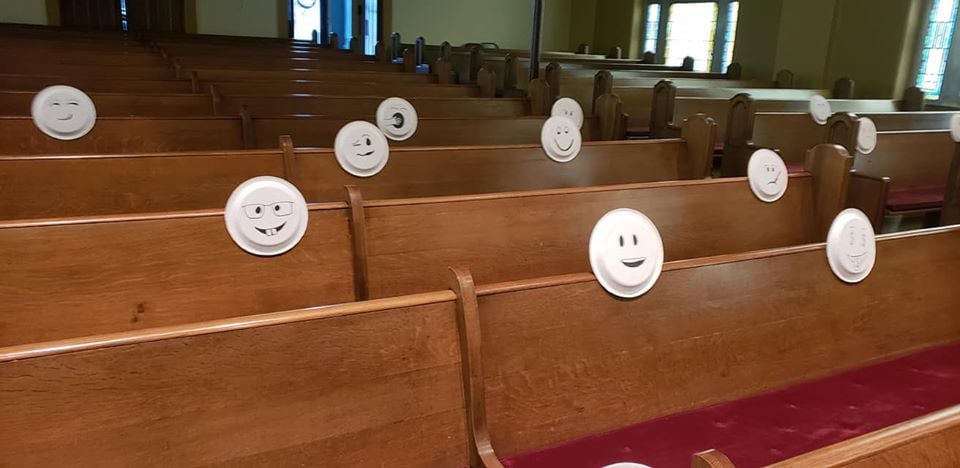The word cubit (′kyü-bǝt) in English appears derived from the Latin cubitum for elbow. It was πήχυς (pay′-kus) in Greek. It measured the length of the forearm from the tip of the middle finger to the end of the elbow. While not a uniform span in people, it was generally about 18 inches. We got the measurement of the foot and inch also from the body and the cubit is no different. Most folks have heard of the cubit even if they have no idea how it compares to more modern spans. Yet the cubit was indispensable in Hebrew life and not just to carpenters.
We have replaced the cubit with another measurement that has also become associated with worship. The appropriate social distance of about 6 feet. The new standard for closeness to God and God's people is four times the cubit (on average). We have all sorts of questions about the cubit but we have accepted almost without a whimper the new standard distance between people in the House of God. Funny, when you think about it. But not so funny.
There was a day when the church was a place for personal connection, where hugs and handshakes were the routine, and where welcome was expressed not in the nod of a masked head but in arms extended in embrace. I am not at all sure that we will return to those days. The fears once planted will not soon be cast aside even after a vaccine is in place. To be fair, this was not simply the result of a virus and the pandemic only accelerated the process of isolation and distance already on the horizon. I understand the fears and I sympathize with those who feel they have no choice but to isolate and keep their distance. But. . . I also worry about the shape of things to come.
When we look at those around us with fear in our heart, it will have a deep and abiding impact on the shape of things to come. When instinct has been taught to shrink from personal contact, it will color the life of the church for a long time. We are already suffering from deep political and cultural divisions and now the religious institutions which once were meeting places have been tainted -- at least according to the constant drumbeat of the media fueling those fears and divisions.
This is not about the survival of the greeting of peace or pot lucks but our life together around the Word and Table of the Lord. This is not about a sentimental view of the past but about a social media and online form of worship which cannot possibly replace our meeting together in the Lord's House on the Lord's Day. This is not about meeting preferences or satisfying what we think people want but being true to who we are as the baptized people of God.
By many accounts a congregation is doing well to have 65-70% of the people who were in church prior to mid-March back in the pews. What will the churches look like if 10% never come back or 15% or more decide that in person worship is not worth it? The impact upon the churches will be felt well into the future. These are the kind of things I wonder about. It is not that I am distressed by them because I have confidence in the Lord's promise that the gates of hell shall not prevail. But I do wonder constantly whether I am doing what I need to be doing as a pastor to encourage our people to return to the Lord's House and Sunday school and Bible study and support the work of the kingdom. I hope that these thoughts are in the minds of most pastors and that none of us are willing to accept the status quo as the final word on our future.

"The appropriate social distance of about 6 feet. The new standard for closeness to God and God's people is four times the cubit (on average)."
ReplyDelete"There was a day when the church was a place for personal connection, where hugs and handshakes were the routine, and where welcome was expressed not in the nod of a masked head but in arms extended in embrace. I am not at all sure that we will return to those days. The fears once planted will not soon be cast aside even after a vaccine is in place."
"I understand the fears and I sympathize with those who feel they have no choice but to isolate and keep their distance."
"When we look at those around us with fear in our heart, it will have a deep and abiding impact on the shape of things to come."
"[N]ow the religious institutions which once were meeting places have been tainted -- at least according to the constant drumbeat of the media fueling those fears and divisions."
Given the context in which you use the word, Rev. Peters, do you consider such a "fear" to be sinful, or is the use of the word similar in meaning to its use in the context of "fear of sitting next to unshielded electrical wiring"?